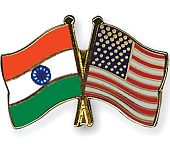 | « Back to article | Print this article |
 Underlining importance of a structured US approach to its bilateral relationship with India, a report by a voluntary organisation has appealed to the Obama administration to continue its cooperation with New Delhi.
Underlining importance of a structured US approach to its bilateral relationship with India, a report by a voluntary organisation has appealed to the Obama administration to continue its cooperation with New Delhi.
"India requires sustained high-level attention, but also a structured US approach to the bilateral relationship. This approach needs to accurately judge how much US and Indian interests will converge and how best to manage the tone of political and diplomatic engagement," a report released by Asia Society said.
According to the 75-page 'The United States and South Asia after Afghanistan' report, the US will best position itself for success after the 2014 military drawdown in Afghanistan by taking a fresh approach to South Asia that considers each country on its own merits.
US should avoid hyphenated 'Indo-Pak', 'Af-Pak' or 'China-India' policies and thinks regionally about economic, security, and political issues, besides connecting South Asia to an overall Asia strategy and integrating diplomatic, defence and development policy agendas, it noted.
"As Secretary of State (Hillary) Clinton has said, the United States is making a strategic bet on India's future," it said.
In an interview for this report, a former assistant secretary of state for South Asian affairs suggested that US and Indian interests "will not always be aligned although they can operate in parallel".
"The US needs a realistic discussion of how quickly the relationship can move forward, particularly on global issues for which India does not always adopt a similar position to that of the United States. The public tone of Washington's messaging on the relationship needs care," it found.
As one interviewee noted, the US "does not need to highlight the value of Indian security cooperation versus that of China", the report said.
However, the greatest policy challenges lie in the US relationship with Pakistan, including vital national interests for Washington, the report noted.
Fundamental to the success of any future approach in this regard must be some deeper work to understand how Pakistan's own governance works, and a greater willingness to work with other states and international organisations, report noted.
"An overly heavy bilateral approach to Pakistan can reinforce some of the negative tendencies in the US-Pakistan relationship," it said.
In the short term, Washington needs to continue to work with Islamabad on counter-terrorism and the drawdown in Afghanistan.
In medium to longer term, the US needs to establish an approach that delivers on vital American interests.
Calling for a longer-term focus on South Asia as one integral part of a rebalancing toward Asia, the report recommends establishing a formal South Asia cadre to provide the South Asia policy leads in the State Department with a defined community of officers.
"These officers would continue to be generalists in their respective policy cones (like political or economic work) but should expect to build South Asia experience during the course of their career," it noted.
The report also calls for establishing a South Asia Presidential Management Fellowship (PMF).
One appointment should be made each year for a two-year term across the inter-agency, it asserted.
The report is prepared by a team of eminent thinkers and written by Asia Society Bernard Schwartz Fellow Alexander Evans.